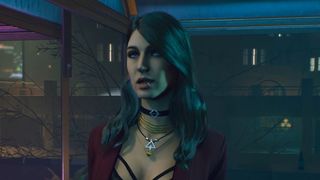
With the Vampire: The Masquerade - Bloodlines 2 release date pushed back until later in 2020, there wasn’t anything new shown off at publisher Paradox’s recent annual convention. Even so, I caught up with senior narrative designer Cara Ellison to chat about why vampires are still cool, what makes a good vampire story in 2019, and how fun it can be to embrace your undead avatar’s mischievous side.
Playing a vampire obviously brings with it elements of power fantasy. You’re undead. You’re smooth as hell (unless you’re a Nosferatu or a Brujah). You have all sorts of superpowers. Yet the World of Darkness is a horror setting, and it's always had to contend with the problem of letting people play as terrifying monsters while still needing to scare them. The original Bloodlines pulled this off with the infamous Ocean House quest, and Ellison says the writing team is trying to dial up the horror wherever they can in the sequel.
"Actually having ultimate power is not that interesting," she says. "That’s why people don’t play through Doom on God Mode. Horror keeps it interesting."
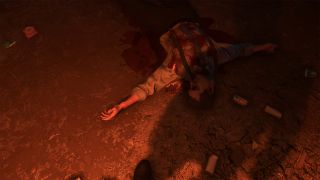
At the core of this push for fear is the idea of the Masquerade itself: an undead social contract designed to prevent the discovery of vampires by the mortal community at large. Violators tend to face harsh punishments for transgressions like attacking someone for a drink of plasma in the middle of a populated street, and the Bloodlines 2 writers plan to use paranoia about this retribution to keep the power fantasy in check.
"We try to make your vampire existence seem precarious all the time," Ellison says. "That you could do one thing and screw it all up. Accidentally kill someone, and then forces bigger than you will come for you. And that actually ties into the basis of [Bloodlines 2], which is neo-noir fiction. The neo-noir protagonist is always co-opted into an existing world that’s already hostile. I feel like Phillip Marlowe always gets beaten up in a back alley. You’re always vulnerable to something that’s more powerful or a narrative that you get swept up in. Violence that isn’t your fault. So what we tried to do with [Bloodlines 2] is make you feel like you’re always looking out for something, and there are horrors beyond your imagination."
At the same time, neo-noir protagonists often have a habit of making trouble for these larger forces around them. Ellison loves to include these types of options, and even compares their presence in Bloodlines 2 to a recent game about pesky waterfowl.
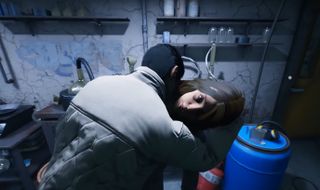
"I like the quests in which you’re making someone miserable," she says. "I’m currently playing Untitled Goose Game. We made some jokes about this, like, it would be very easy to turn our game into Goose Game in a way. With the vampire goose that’s annoying people. And that’s basically what you do as a vampire. You’re this Thin-blood who goes around irritating people and screwing up their day, making situations worse all the time."
The biggest gaming news, reviews and hardware deals
Keep up to date with the most important stories and the best deals, as picked by the PC Gamer team.
When it comes to mischievous vampires, the first thing that comes to my mind is the demented Malkavian clan. Their portrayal has changed a lot over the years, with the first Bloodlines and some of the earliest Vampire supplements in the '90s playing up their unpredictable and abnormal behavior for humorous effect. Scenes that involved things like having conversations with inanimate objects were clearly written to amuse, rather than revealing the problems that arise from having their particular brand of vampiric powers. In writing Bloodlines 2, modernizing the Malkavians was a clear challenge, but Ellison believes the team has made positive steps by acknowledging the issues mental illness poses in a more tangible way.
"We want to get more into how having mental health issues actually are a barrier to your enjoyment of the world," she says. "They make things difficult. They provide more obstacles. And they change your perception of events and situations. I suffer from depression, and it’s actually quite hard to write about depression, because it’s a difficult thing to experience. But I think it’s important to do."
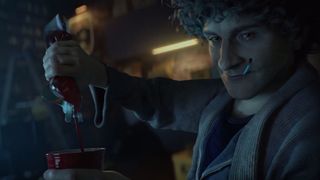
At the same time, the writers don’t want to stray from allowing humor into their portrayal of the clan. "The humor is still there in the Malkavian content," Ellison explains. "But it comes more from how weird the situation is, instead of it being a joke at the expense of the Malkavian. You’re in a weird situation and your clan weakness makes it weirder."
Ellison relates that the key to ensuring these quests can be interesting and deal with heavy subjects, but still sensitive to players’ lived realities, is often just listening.
"I have written a mission that has to do with body issues,” she recalls. “And I’m interested in them because I have issues with my own appearance. So I have a little bit of body horror sometimes, or a feeling that I don’t quite fit in my body… so I thought it would be interesting to approach that. I think I had the character say something like, ‘Oh, I’m not ugly anymore!’ And someone really considerate at the studio was implementing that [mission], and they got back to me and said, 'This line here? That’s really painful.'"
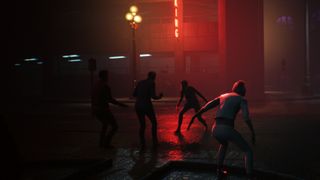
But sensitivity doesn’t have to mean avoiding these subjects altogether, Ellison says. After discussing the text further, there turned out to be a simple solution that everyone found acceptable.
"The solution was to put 'ugly' in quotation marks," she says. "And then, the meaning of it gets across better. She’s using it ironically. It’s about so-called ugliness. A societal idea of ugliness. Because today we’re aware that this is going to go out to an audience that, you know, they have a number of these issues and are maybe aware of them more, I think that’s an amazing challenge to writers to give that level of quality. So I love feedback like that, because it means I can try to serve people more effectively."
Doing extra work to serve players more effectively has also manifested in it being delayed out of its original release window. We don’t know exactly when we might get our fangs on it now, but you can read more about why this decision was made in Fraser's interview with Brian Mitsoda.
Most Popular


